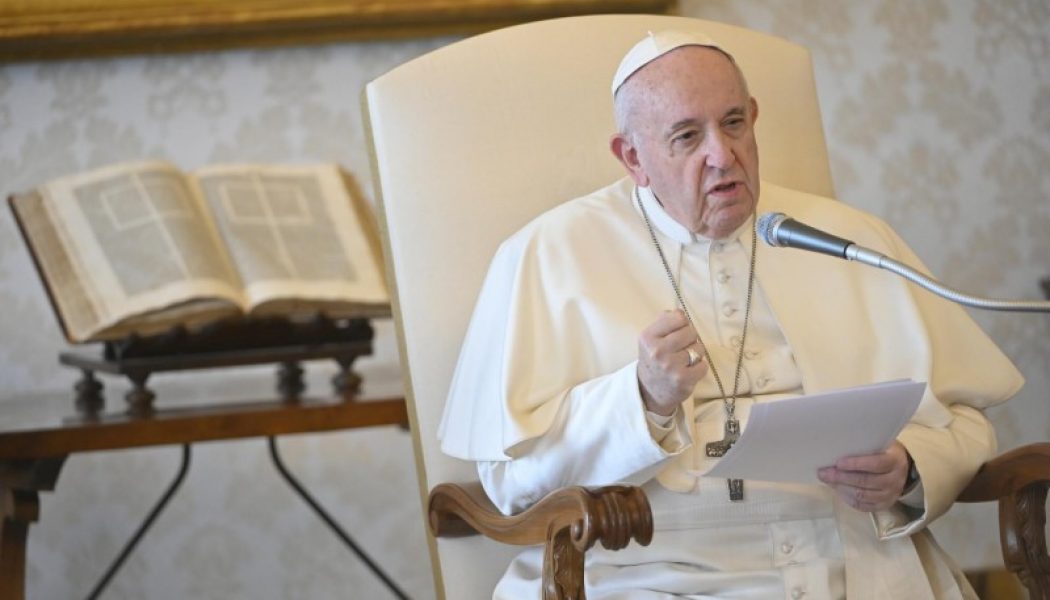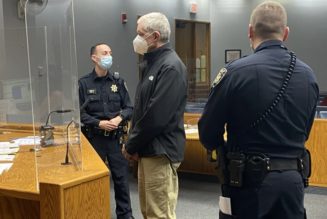
This morning’s General Audience was held at 9:30 am from the Library of the Apostolic Vatican Palace.
Continuing with the series of catecheses on the Beatitudes, in his address in Italian the Pope focused his meditation on the seventh: “Blessed are the merciful, for they shall obtain mercy” (Matthew 5:7).
After summarizing his catechesis in several languages, the Holy Father expressed special greetings to the faithful. Then he made an appeal for the celebration of the next 24 Hours for the Lord (March 20-21, 2020).
The Audience ended with the Apostolic Blessing.
* * *
The Holy Father’s Catechesis
Dear Brothers and Sisters, good morning!
Today we pause on the <seventh> Beatitude, which says: “Blessed are the merciful, for they shall obtain mercy” (Matthew 5:7). There is a particularity in this Beatitude: it’s the only one in which the cause and fruit of happiness coincide: mercy; those that exercise mercy will find mercy; they will be “mercied.”
This theme of mutual forgiveness isn’t present only in this Beatitude, but is recurrent in the Gospel. And how could it be otherwise? Mercy is the heart itself of God! Jesus says: “Judge not, and you will not be judged; condemn not, and you will not be condemned; forgive, and you will be forgiven” (Luke 6:37) — always the same reciprocity. And James’ Letter affirms that mercy “triumphs over judgment” (2:13).
However, above all, it’s in the Our Father that we pray: “Forgive us our debts, as we also have forgiven our debtors” (Matthew 6:12); and this question is the only one resumed at the end: “For if you forgive men their trespasses, your heavenly Father also will forgive you; but if you do not forgive men their trespasses, neither will your Father forgive your trespasses” (Matthew 6:14-15; Cf. Catechism of the Catholic Church, (CCC), 2838). There are two things that can’t be separated: the forgiveness given and the forgiveness received. However, so many people are in difficulty, they are unable to forgive. So many times the harm received is so great that to succeed in forgiving seems like climbing a very high mountain: an enormous effort; and one thinks it can’t be done, this can’t be done. On our own, we can’t, we need God’s grace, we must ask for it. In fact, if the seventh Beatitude promises to find mercy and in the Our Father we ask for the remission of debts, it means that we are essentially debtors and we are in need of finding mercy!
We are all debtors — all — to God, who is so generous, and to brothers. Every person knows that they are not the father or the mother that they should be, the husband or the wife, the brother or the sister that they should be. We are all “in deficit” in life. And we are in need of mercy. We know that we also have done wrong; something is always lacking of the good we should have done.
However, precisely this poverty of ours becomes the strength to forgive! We are debtors and if, as we heard at the beginning, we will be measured with the measure with which we measure others (Cf. Luke 6:39), then we should enlarge the measure and remit debts, forgive. Everyone must remember that they are in need of forgiveness, to have need of forgiveness, to have need of patience; this is the secret of mercy: by forgiving one is forgiven. Thus God precedes us and forgives us first (Cf. Romans 5:8). By receiving His forgiveness we become capable in turn to forgive. So our own misery and our own lack of justice become occasions to open oneself to the Kingdom of Heaven, to a greater measure, God’s measure, which is mercy.
From where is our mercy born? Jesus has said to us: “Be merciful, as your Father is merciful” (Luke 6:36). The more the Father’s love is received, the more one loves (Cf. CCC, 2842). Mercy isn’t a dimension among others, but is the center of Christian life: there is no Christianity without mercy.[1] If all our Christianity doesn’t lead us to mercy, we have mistaken the way, because mercy is the only true end of every spiritual journey. It’s one of the most beautiful fruits of charity (Cf. CCC, 1829).
I remember that this theme was chosen for the first Angelus that I said as Pope: mercy. And this has remained very impressed on me, as a message that, as Pope, I must always give, a message that should be for every day: mercy. I remember that that day I also had a somewhat “shameless” attitude to publicize a book on mercy,, just published by Cardinal Kasper. And that day I felt so strongly that this is the message I must give, as Bishop of Rome: mercy, mercy, please, forgiveness.
God’s mercy is our liberation and our happiness. We live of mercy and we can’t permit ourselves to be without mercy: it’s the air to breathe. We are too poor to set conditions; we are in need of forgiving because we are in need of being forgiven. Thank you!
[Original text: Italian] [ZENIT’s translation by Virginias M. Forrester]
© Libreria Editrice Vatican
In Italian
I warmly greet the Italian-speaking faithful, with a special thought for the young people, the elderly, the sick and the newlyweds.
Tomorrow we will celebrate the Solemnity of Saint Joseph. In life, in work, in the family, in joy and in sorrow, he always sought and loved the Lord, meriting Scripture’s praise as a just and wise man. Invoke him always with trust, especially in difficult moments, and entrust your existence to this great Saint.
I make my own the appeal of the Italian Bishops who in this health emergency have promoted a moment of prayer for the whole country. Every family, every faithful, every Religious Community, all united spiritually tomorrow at 9:00 pm for the recitation of the Rosary, with the Mysteries of Light. I will accompany you from here. Mary, Mother of God, Health of the Sick, leads us to the luminous and transfigured face of Jesus Christ and to His Heart. We turn to Her with the prayer of the Rosary, under the loving gaze of Saint Joseph, Custodian of the Holy Family and of our families. And we ask him to guard our family, our families, in a special way, in particular the sick and the persons taking care of the sick: the doctors, the men and women nurses, the volunteers, who risk their lives in this service.
[Original text: Italian] [ZENIT’s translation by Virginia M. Forrester]
© Libreria Editrice Vatican
The Holy Father’s Appeal
Next Friday and Saturday, March 20-21, the initiative 24 Hours for the Lord will be held. It’s an important appointment of Lent for prayer and for approaching the Sacrament of Reconciliation.
Unfortunately, in Rome, in Italy and in other countries, this initiative won’t be able to take place in the usual ways because of the Coronavirus emergency. However, in all the other parts of the world, this beautiful tradition will be continued. I encourage the faithful to approach sincerely God’s mercy in Confession and to pray especially for all those being tested because of the pandemic.
Where the 24 Hours for the Lord can’t be celebrated, I’m certain that this penitential moment will be able to be lived with personal prayer.
[Original text: Italian] [ZENIT’s translation by Virginia M. Forrester]
© Libreria Editrice Vatican
[1] Cf. Saint John Paul II, Encyclical Dives in Misericordia (November 30, 1980); Bull Misericordia Vultus (April 11, 2015); Apostolic Letter Misericordia et Misera (November 20, 2016).







